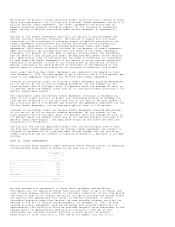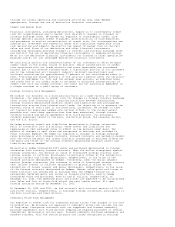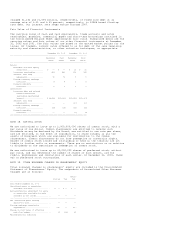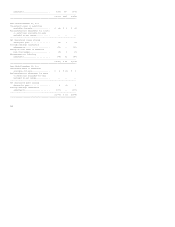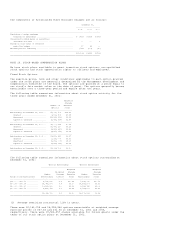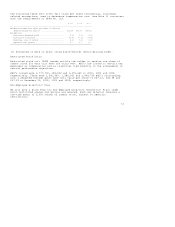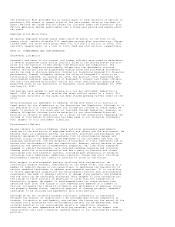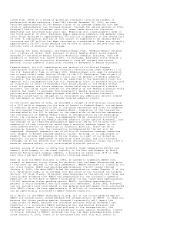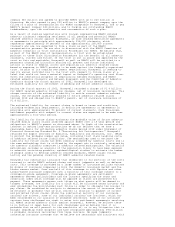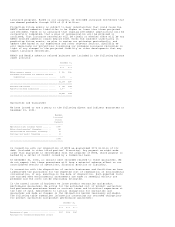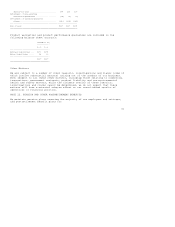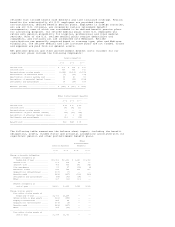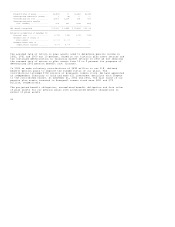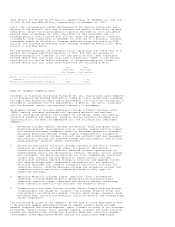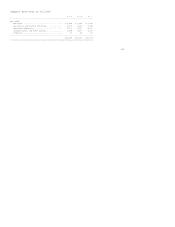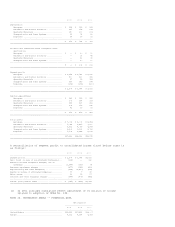Honeywell 2002 Annual Report Download - page 266
Download and view the complete annual report
Please find page 266 of the 2002 Honeywell annual report below. You can navigate through the pages in the report by either clicking on the pages listed below, or by using the keyword search tool below to find specific information within the annual report.lated form. There is a group of potential claimants consisting largely of
professional brake mechanics. From 1981 through December 31, 2002, we have
resolved approximately 60,000 Bendix claims at an average indemnity cost per
claim of approximately two thousand dollars. Through the second quarter of 2002,
Honeywell had no out-of-pocket costs for these cases since its insurance
deductible was satisfied many years ago. Beginning with claim payments made in
the third quarter of 2002, Honeywell began advancing indemnity and defense claim
costs which amounted to approximately $70 million in payments in the second half
of 2002. A substantial portion of this amount is expected to be reimbursed by
insurance and $57 million has been recorded as a receivable. There are currently
approximately 50,000 claims pending and we have no reason to believe that the
historic rate of dismissal will change.
On January 30, 2003, Honeywell and Federal-Mogul Corp. (Federal-Mogul) entered
into a letter of intent (LOI) pursuant to which Federal-Mogul would acquire
Honeywell's automotive Bendix Friction Materials (Bendix) business, with the
exception of certain U.S. based assets. In exchange, Honeywell would receive a
permanent channeling injunction shielding it from all current and future
personal injury asbestos liabilities related to Honeywell's Bendix business.
Federal-Mogul, its U.S. subsidiaries and certain of its United Kingdom
subsidiaries voluntarily filed for financial restructuring under Chapter 11 of
the U.S. Bankruptcy Code in October 2001. Federal-Mogul will seek to establish
one or more trusts under Section 524(g) of the U.S. Bankruptcy Code as part of
its reorganization plan, including a trust for the benefit of Bendix asbestos
claimants. The reorganization plan to be submitted to the Bankruptcy Court for
approval will contemplate that the U.S. Bankruptcy Court in Delaware would issue
an injunction in favor of Honeywell that would channel to the Bendix 524(g)
trust all present and future asbestos claims relating to Honeywell's Bendix
business. The 524(g) trust created for the benefit of the Bendix claimants would
receive the rights to proceeds from Honeywell's Bendix related insurance
policies and would make these proceeds available to the Bendix claimants.
Honeywell would have no obligation to contribute any additional amounts toward
the settlement or resolution of Bendix related asbestos claims.
In the fourth quarter of 2002, we recorded a charge of $167 million consisting
of a $131 million reserve for the sale of Bendix to Federal-Mogul, our estimate
of asbestos related liability net of insurance recoveries and costs to complete
the anticipated transaction with Federal-Mogul. Completion of the transaction
contemplated by the LOI is subject to the negotiation of definitive agreements,
the confirmation of Federal-Mogul's plan of reorganization by the Bankruptcy
Court, the issuance of a final, non-appealable 524(g) channeling injunction
permanently enjoining any Bendix related asbestos claims against Honeywell, and
the receipt of all required governmental approvals. We do not believe that
completion of such transaction would have a material adverse impact on our
consolidated results of operations or financial position. There can be no
assurance, however, that the transaction contemplated by the LOI will be
completed. Honeywell presently has $2 billion of insurance coverage remaining
with respect to Bendix related asbestos claims. Although it is impossible to
predict the outcome of pending or future claims, in light of our potential
exposure, our prior experience in resolving these claims, and our insurance
coverage, we do not believe that the Bendix related asbestos claims will have a
material adverse effect on our consolidated financial position.
Another source of claims is refractory products (high temperature bricks and
cement) sold largely to the steel industry in the East and Midwest by North
American Refractories Company (NARCO), a business we owned from 1979 to 1986.
Less than 2 percent of NARCO's products contained asbestos.
When we sold the NARCO business in 1986, we agreed to indemnify NARCO with
respect to personal injury claims for products that had been discontinued prior
to the sale (as defined in the sale agreement). NARCO retained all liability for
all other claims. NARCO had resolved approximately 176,000 claims through
January 4, 2002, the date NARCO filed for reorganization under Chapter 11 of the
U.S. Bankruptcy Code, at an average cost per claim of two thousand two hundred
dollars. Of those claims, 43 percent were dismissed on the ground that there was
insufficient evidence that NARCO was responsible for the claimant's asbestos
exposure. As of the date of NARCO's bankruptcy filing, there were approximately
116,000 remaining claims pending against NARCO, including approximately 7
percent in which Honeywell was also named as a defendant. Since 1983, Honeywell
and our insurers have contributed to the defense and settlement costs associated
with NARCO claims. We have approximately $2 billion of insurance remaining that
can be specifically allocated to NARCO related liability.
As a result of the NARCO bankruptcy filing, all of the claims pending against
NARCO are automatically stayed pending the reorganization of NARCO. In addition,
because the claims pending against Honeywell necessarily will impact the
liabilities of NARCO, because the insurance policies held by Honeywell are
essential to a successful NARCO reorganization, and because Honeywell has
offered to commit the value of those policies to the reorganization, the
bankruptcy court has temporarily enjoined any claims against Honeywell, current
or future, related to NARCO. Although the stay has been extended eleven times
since January 4, 2002, there is no assurance that such stay will remain in


